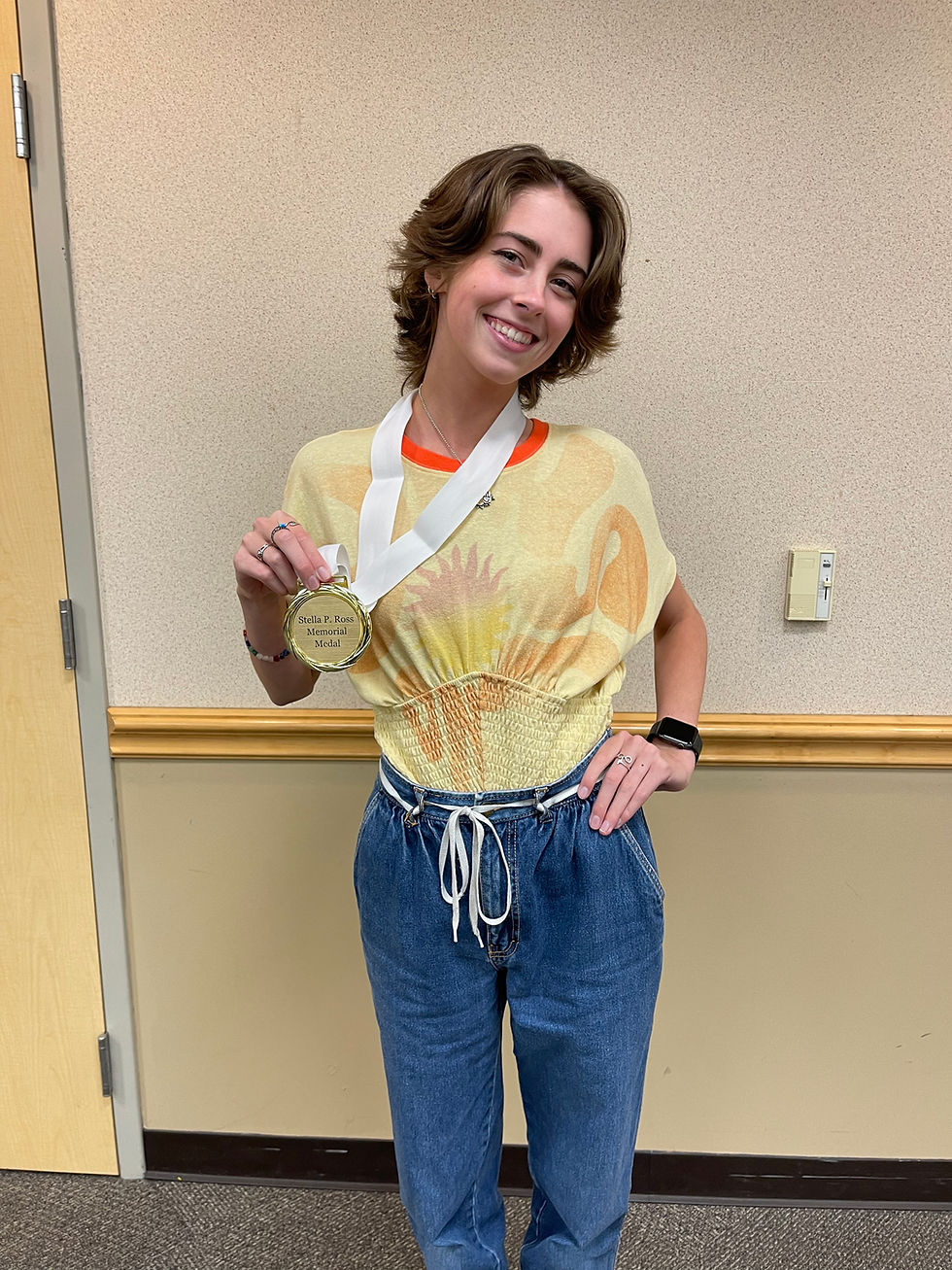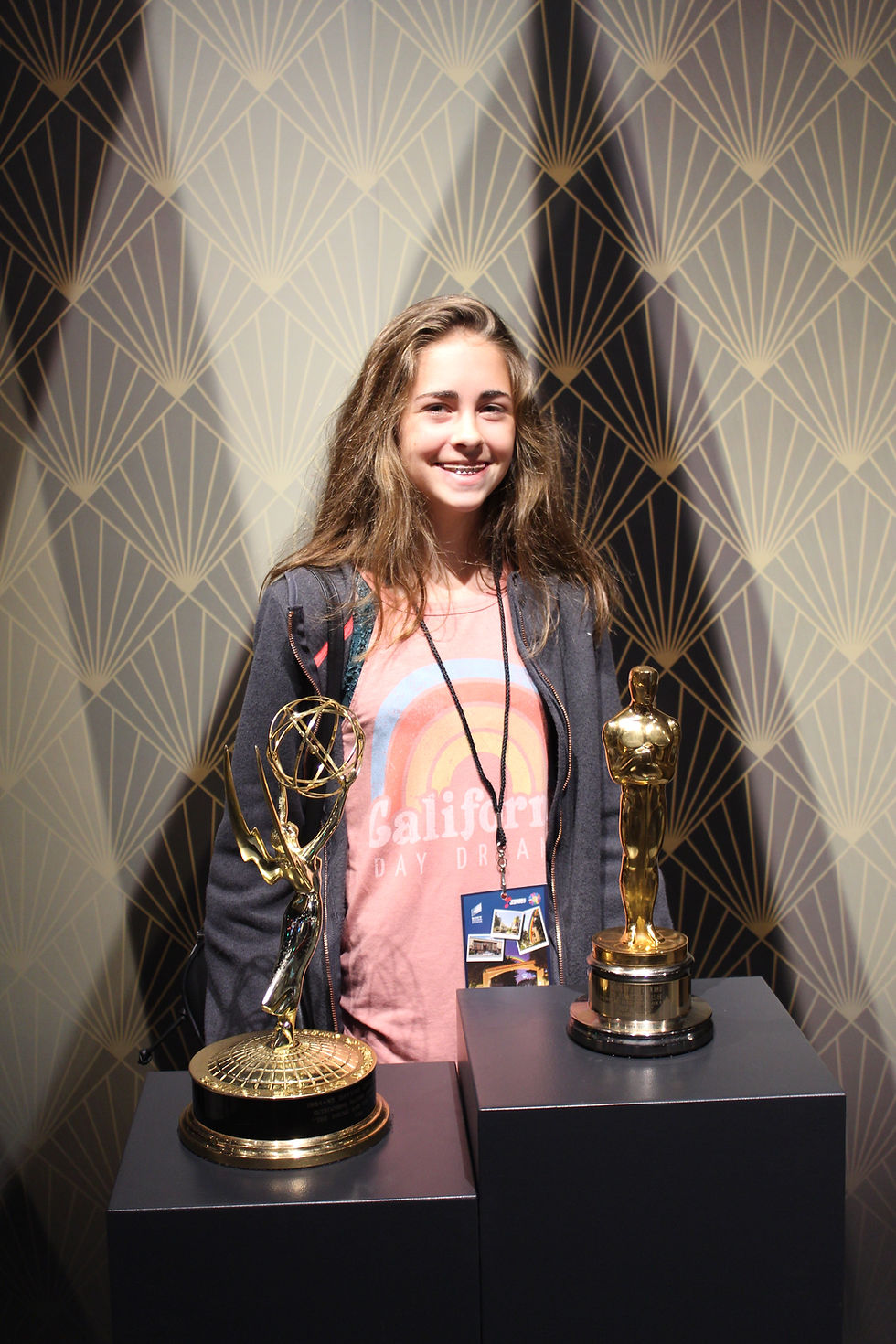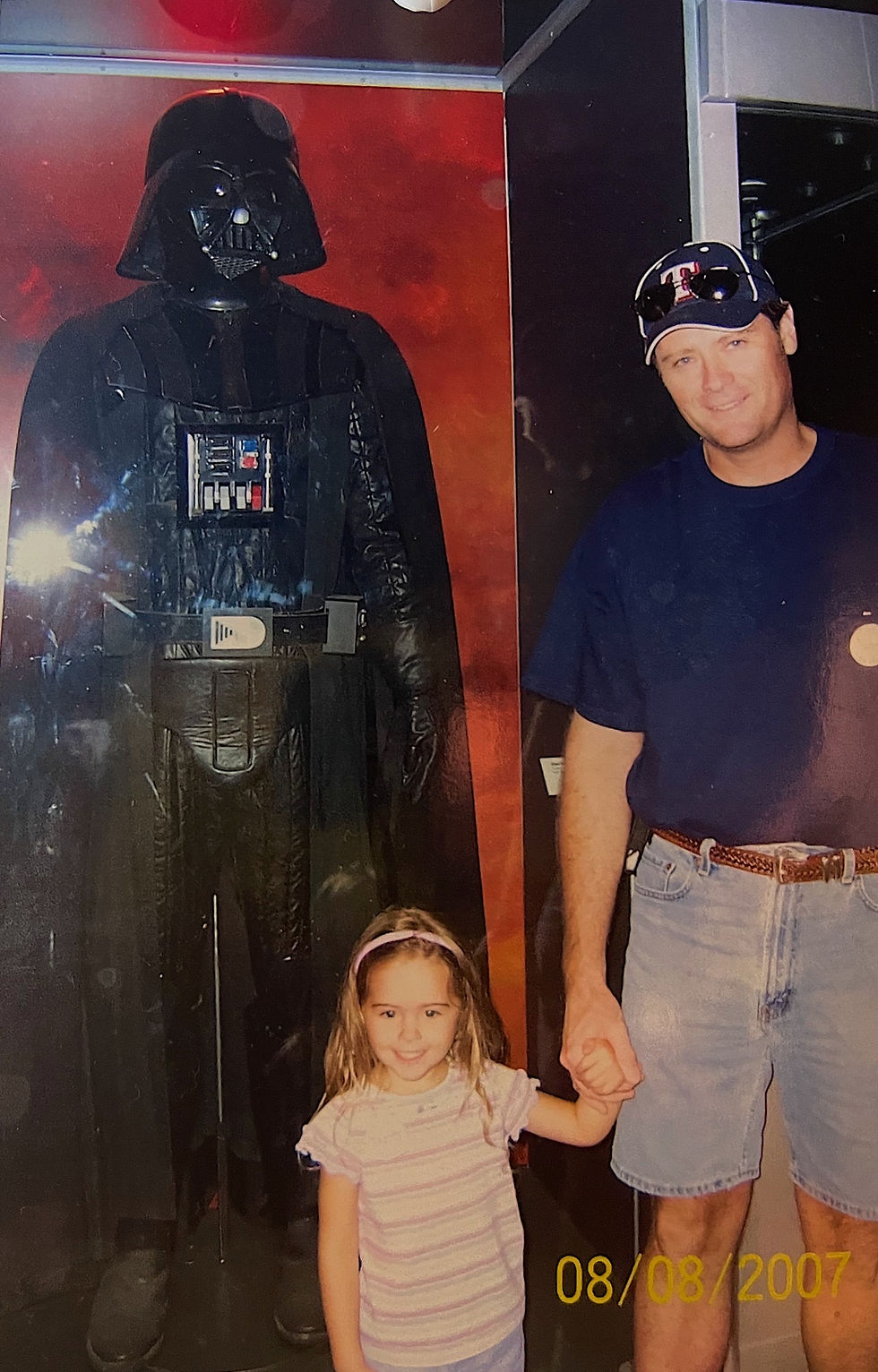
You actually wanted to read it? Got me blushing and kicking my feet in my speech class. This was my submission for my English Departmental Award nomination, to which I received the Stella P. Ross Memorial Medal, quote "presented to the student who makes the most progress in the academic discipline of English during the school year [and] shall be selected by members of the English faculty of the University." My head is too big anyways, but I am crazy blessed to be donned with this honor, Star Wars style even as my literature professor Dr. Dumas (Dr. Doom, if you will) placing the award around my neck. Earlier that week, having achieved honorary status through two semesters of class with Doom and being an officer of English Club, I was inducted as a member of the Legion of Doom, where I was given a Sith name and furthering solidified the Star Wars-ness of him and I's mentorship. I was given Darth Atra, the darth of darkness, a completely ironic little thing considering my whole personality being the biggest ball of sunshine you might ever meet. That being said, the psyche of my literary works venture into dark territory, that being the inspiration Dumas chose for name, as he claimed that Darth Cinema was "too obvious." Fair point, as you're about to read my bleeding-heart love letter to film.
Fine, I'll release y'all from the prison of anticipation for what I feel is my first true passion project in academia. Enjoy.

Managed to pull some strings to time travel and get this pic from a couple of years from now.
Mostly just embarrassed for my eyebrows and having to get braces again...jokes, haha funny jokes. Sony Studio Tour circa 2017.
AN ODE TO MY AMORPHOUS BLOB
MO SMITH
Music. Sound. All encompassing or a complete lack thereof. Senses are vital in the multi-faceted nature of humanity, sight or vision or…the others. Sound being a dominant trait of this nature, is there sufficient power in noise versus music? Between this concoction of composition and chaos, is there a neutral ground? History has progressed, traveling across centuries of discovery, and all to find the penultimate answer: yes. A whole medium. Film.
Music was not always a component of visual media. When it couldn’t be instilled in the film itself, there sat a pianist, tickling ivory alongside the actions appealing to the eyes on the screen. Films accompanied by the silent film era’s king Buster Keaton were also accompanied by these piano scores, an example being William P. Perry’s original composition for The General (1926). With no music, there also came an absence of sound. Humans are smart, supposedly, so this left a need for active pretending when it comes to crashes, bangs, and onomatopoeias beyond.
Then…the next year happened. When the magic implementation of sound and music strided into the scene with 1927’s The Jazz Singer, the movement struck, and it struck well. Incorporating this momentous shift in cinema, there sits 1952’s Singin’ in the Rain. The film’s plot follows silent film star Don Lockwood (portrayed by song, dance, and acting prodigy Gene Kelly) as the era of no noise becomes no more. The Jazz Singer is released mid-production of Lockwood’s latest film, so the director decides to dip his toes in adding sound before its release in hopes of similar traction to this new sensation. What follows is an overstimulating auditory nightmare that makes all parties involved a complete joke to the industry. After gaining musical talent from Lockwood’s love interest Kathy Selden (Debbie Reynolds), a strategy of synchronizing Kathy’s voice over the female lead saves the hindquarters of many careers, sparks another, and seers another. Sorry but not so sorry to Miss Lina Lamont!
Much like the art of cinema, the art of music is connected via an amorphous blob. With each new song, there is another lump in this blob, an incessant yet beautiful phenomenon. Aforementioned, the works of time are ever-changing, whether it be the next second or next century. In my film class’s 67-year span of film exposure, we were introduced to the most iconic soundtracks, leitmotifs, and everything in between. Due to the pleasant blame of Arthur Freed, Ennio Morcone, John Williams, or even the Beatles, each inspired one another to expand the art for which they worked so passionately.
Damien Chazelle wanted an adult coming-of-age story of realizing love, identity, and doing both those things with jaw dropping musical numbers. Thus, the Singin’ In the Rain to La La Land pipeline. The magic of song is not merely characterization to these stories, but the soul of its takeover on pop culture. La La Land and all its glory to old school Hollywood went on to gather 14 Oscar nominations and 6 wins, a third of those wins acclaimed to the music. Chazelle and his charming concertos continue into his portfolio, especially with his triple Oscar snare trap of a film Whiplash (2014). The ambition to simply “make it” is not enough for Damien’s characters, it is a weakness. Working to physical, and more importantly romantic disarray brings out the best, and more importantly the worst of people on screen, but can easily reflect into the real lives of its viewers.
Although my class didn’t cover the works of modern movie Picasso Quentin Tarantino, there is a general cinephilic knowledge of his endearing admiration of Sergio Leone’s The Good, the Bad, and the Ugly (1966). This film carries the most iconic western theme on its fringed shoulders, but also gifts the visual senses with ahead-of-time techniques in camerawork and editing. Tarantino pays homage thousands-fold through his filmography, from Reservoir Dogs to Once Upon a Time in Hollywood. Fans of his work are no stranger to the artsy editing on actor’s feet, dutch-angle trunk shots, and musical cues for the kids who bought tickets to make out, then proceed to go from sucking face to sucked in when “Stuck in the Middle With You” starts playing.
The movement prolongs. Steven Spielberg collaborated with renowned composer John Williams from 1974’s Sugarland Express to 2022’s The Fabelmans, his last composition before retiring at the ripe and budding age of 90 years old. Nearly half a century’s worth of unforgettable storytelling through strings and brass has told the stories of man-eating sharks, hidden extra terrestrials, or the incredibly real story of a selfish to selfless man in 1993’s Schindler’s List. The journey of Oskar Schindler and his gradually softened heart towards the Jewish people of Krakow is an important story told through an important director’s eyes. As a fellow Jewish man, Spielberg did not fail to show the justice that perseveres through the face of oppression. Although a questionably motivated sympathizer as the film opens, it concludes with a man who has witnessed the graceless acts committed upon people he depended on, and who tried with significant amounts of might to save who he could. He questioned if he could’ve done more. He is an honor to the Jewish community, and his story a septennial Academy Award winner.
Okay. I’ve written in previous essays that I could write an entirely separate yet equally thorough piece about the “Twist and Shout” sequence in 1986’s Ferris Bueller’s Day Off. A hodgepodge of a cultural reset, if you will. This paper involves the music across multiple films we covered in class, but this is my chance after speaking about the others to step upon the soap box that is “My Need for Flash Mobs in Film.”
Cameron Frye and Sloane Peterson are sharing what seems to be the breakthrough of vulnerability to what they fear about their futures. Their common ground, the alternating best-and-boy friend, is a festering element in their wake. Ferris Bueller will always get what he wants, never what is coming to him, and his adversaries and allies alike will watch and wane. What this scene perfectly encapsulates is that amidst this eye-opening conversation about the inevitability of strife into adulthood, Ferris intrudes with a fabulous dance number to The Beatles’s “Twist and Shout.” The man is a villain, purely a thief of serenity, but the man also gathers the entire city of Chicago to sing a bridge that purely consists of the sound “Awwww…” John Hughes, by proxy of a high school senior named of all names Ferris, brought together all ages (a little kid covering their ears), all races (the men and women on the stairs), all countries (the man is on a Fräulein float), and all classes of life to show the undeniable joy of a shared love for music. Hell, a window cleaner bops his head whilst hanging from a wooden slat…with no harness..what!
Growing up as an avid dance class attendant, participating in the holy trinity of competitive, recreational, and theatrical styles, I occupied many fascinations with “dance in film” compilations on YouTube. While also being a cinephile from day one of my existence, I recognized the likes of Singin’ In the Rain, Footloose, Breakfast Club, Beetlejuice, and especially Napoleon Dynamite. I’m a woman of culture, and I’m proud to don that as a given in my identity. Though a dead track interpretive dance number is deeply poetic and psychological to the senses, I also appreciate the necessity of a musical accompaniment to a routine. As the human alongside it does the same, music moves. Notes cascade down scales as Gene Kelly and his two companions descend down slippery stairs. I knew “Good Morning” as the song in the Tropicana orange juice commercial before the iconic dance number in the musical, so I understand only a minuscule doubt in my “woman of culture” claim. Connecting actors to oranges, I not only am an avid dance class attendant, but also a vitamin C advocate.
Back to “Good Morning.” There was great physical taxation on all three of the starlets involved. Debbie Reynolds, no dance experience under her belt pre-Singin,’ made heavy claims of her 15-hour shooting of the number being one of her greatest accomplishments in her career. She even went on to say in her 2013 memoir: “Making Singin’ in the Rain and childbirth were the two hardest things I’ve ever done.” There is no secret of the discipline required of performers, but there should also be an honorable nod to the carnivorous composers, emaciated musicians, and starving artists taking the mental deterioration of making these masterpieces.
What does this mean to me? I’m including this question as if I haven’t been pouring my ever-loving heart out for the last 1400 words, but the truth is music has saved me and it continues to save me. There is not a doubt in my mind, my heart, my body, or my soul that there have been moments in my life so broken that only a song couldn’t heal. It’s a total groaner, but it makes me who I am, through and through. If I am not fully attentive to a class or watching something on a screen, I am listening to something. Call it my generation melting away at our addictive attachment to media, but I identify it as an accessible haven when I can’t find words. I like to think I’m pretty good with verbalizing situations, writing about nothing forever, or just sending an encouraging text to a friend. Unfortunately, like many other humans experience, words fail. Exponentially. I can consistently rely on the tendrils of music, all of its amorphousness, lyrically or instrumentally, and I can listen.
What else has saved me? Movies. My friends and family gawk at how I recite banterful dialogue upon first watches, I watch Criterion closet picks on YouTube, and I’ve had a note in my phone dedicated to what I want in my future home, the top of the list proudly belonging to “movie room.” I’m talking about a sanctuary to experience film. Truly, if I never figure out what my purpose is on this Earth, I hope a reason amongst them all is to show others the life-giving floatation device that is cinema. I’ll show them the pluckiness of The General, the vicious script of The Philadelphia Story, the insistent joy from Singin’ In the Rain, the tertiary attentiveness of Rear Window, the impulsiveness of Cléo from 5 to 7, the blueprint of westerns that is The Good, the Bad, and the Ugly, the kindness amongst differences in In the Heat of the Night, the pure suspense (and feline appreciation) of Alien, the absurdity of seriousness of Ferris Bueller’s Day Off, and the importance of historical, moral, and cinematic documents from Schindler’s List.
Is it better to hold mystery than feign certainty? I am unsure of more things than ever. There’s enough mystery in my life, I’m sure there’s an assortment of maps and clues to some X-marked spot. I use this metaphor, but sometimes I wish it were true. If I venture across enough lands and answer a few riddles, my meaning in life will materialize in some form or another. But, these are few times that I wish for this. Truth is, I like not knowing where I’m going. There’s no fun in certainty, so who needs it? In the words of a charming man, who spoke in no context related to my existentialism but rather prehistoric reptiles: “Life finds a way.”
Cheers,
Mo.

My Lord-ship has been in training for as long as I can remember. Darth Atra and Dux (captain), and yeah, Vader's here, too. Thanks, Dad. For having your life changed in 1977, making my life in 2004, and continuously feeding my flame.
Comentários